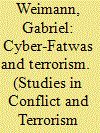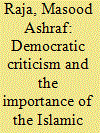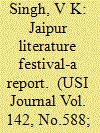| Srl | Item |
| 1 |
ID:
107644


|
|
|
|
|
| Publication |
2011.
|
| Summary/Abstract |
In 1989, the term fatwa became globally known, following Ayatollah Khomeini's death-fatwa issued on Salman Rushdie for his novel, Satanic Verses. Today, the Internet has become a useful platform for posting of fatwas and interpretations of fatwas. The present article highlights the use of jihadist fatwas, and especially online fatwas, as a major instrument in bridging the current wave of terrorism and religion. The analysis, based on a database collected in a 12-year-long project of monitoring thousands of terrorist websites, illustrates how cyber-fatwas are related to key issues in promoting terrorism: justifying the use of suicide terrorism, the killing of innocents, the killing of children and women, the killing of Muslims or the use of various weapons (including weapons of mass destruction and cyberterrorism). There are two implications of the trends documented in this study: First, the analysis of the online fatwas and the fatwa wars may provide insight about the terrorists, their motivations, their doubts and fears and, secondly, it may guide countercampaigns.
|
|
|
|
|
|
|
|
|
|
|
|
|
|
|
|
| 2 |
ID:
123071


|
|
|
|
|
| Publication |
2013.
|
| Summary/Abstract |
Relying on major debates in reception and reader response theory, this essay attempts to explore the possibilities of reading metropolitan texts about Islam and Islamic culture with an understanding of the Islamic modes of meaning-making and interpretation. Geared toward scholars and students of literature and culture, the essay hopes to foster a more nuanced and complex approach to reading texts that appropriate Islamic raw materials in order to represent a mostly Western poetics and politics.
|
|
|
|
|
|
|
|
|
|
|
|
|
|
|
|
| 3 |
ID:
117217


|
|
|
| 4 |
ID:
079531


|
|
|
|
|
| Publication |
2007.
|
| Summary/Abstract |
In Shalimar the Clown, Salman Rushdie fashions a novel of global proportions, tracing the interlacing fortunes of characters from a small Kashmiri village and from the metropolises of North America and Europe. Against the backdrop of international networks of diplomacy, capital and Islamic terrorism, and the repressive forces of the Indian state, Rushdie explores both vernacular and global articulations of cosmopolitanism. The essay argues mainly that Rushdie draws in this novel on the ideal of Kashmiriyat to imagine possibilities of conviviality across religious differences. Ultimately, he projects this ideal of a reconstituted Kashmiriyat, characterized as a vernacular form of cosmopolitanism, onto a global screen. Appealing as such a projected ideal might be, it is problematic in that it advances an elite vision of cosmopolitanism
|
|
|
|
|
|
|
|
|
|
|
|
|
|
|
|
| 5 |
ID:
113605


|
|
|